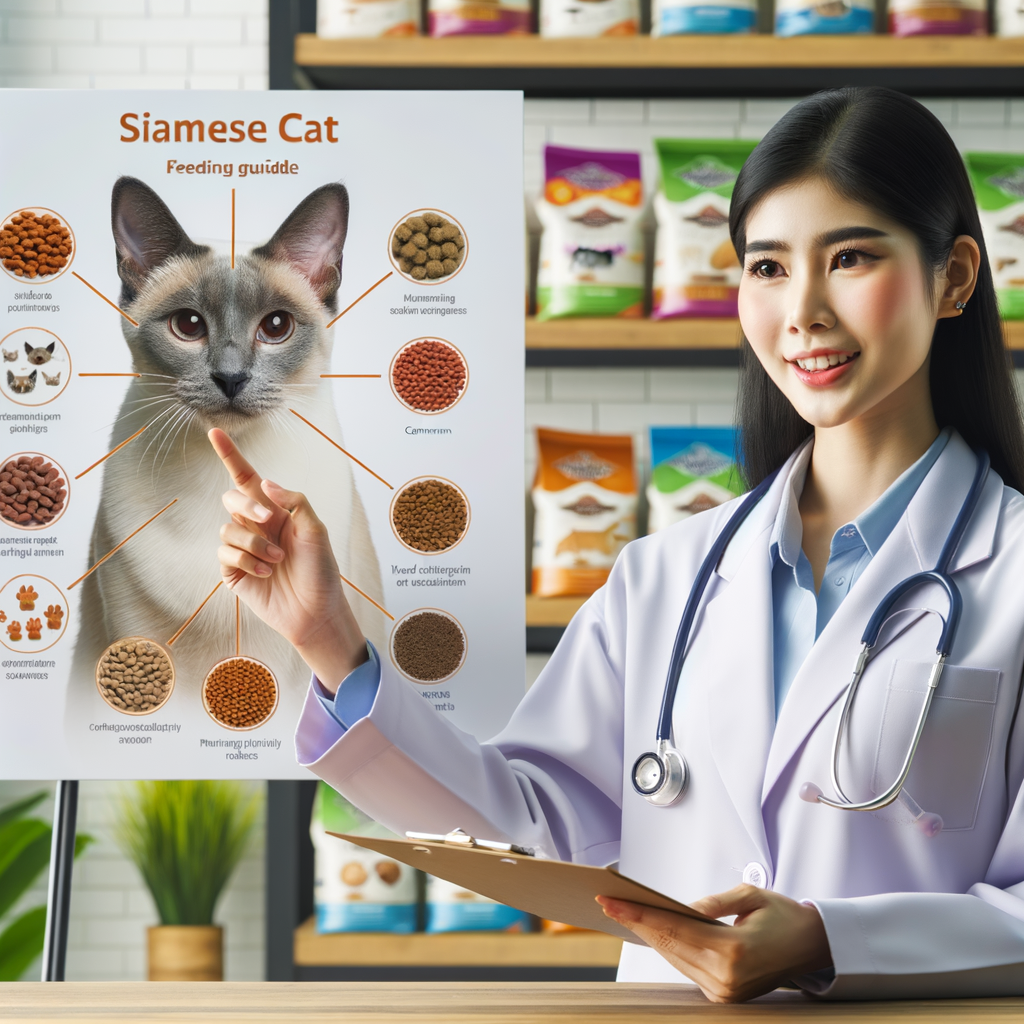
Introduction to Siamese Cat Nutrition
When it comes to the health and well-being of your Siamese cat, nutrition plays a crucial role. Just like humans, cats require a balanced diet to maintain their health and vitality. This is particularly true for Siamese cats, which have unique dietary needs compared to other breeds. In this section, we will delve into the importance of nutrition for Siamese cats and how their diet can affect their health.
- Understanding the Importance of Nutrition for Siamese Cats
- How Diet Affects Siamese Cat Health
Nutrition is the foundation of a Siamese cat’s health. A well-balanced diet provides the energy your cat needs to play and explore, supports their immune system, and contributes to a shiny, healthy coat. It also helps to prevent obesity, a common health issue in Siamese cats.
Siamese cats require a diet rich in protein, as they are naturally active and muscular. They also need certain vitamins and minerals to support their overall health. For example, taurine, an essential amino acid, is crucial for their heart health, while vitamin A supports their vision.
The diet of a Siamese cat can significantly impact their health. A diet lacking in essential nutrients can lead to a variety of health problems, including heart disease, vision problems, and a weakened immune system. On the other hand, a diet that is too rich can lead to obesity and related health issues, such as diabetes and joint problems.
It’s also important to note that Siamese cats can be prone to certain genetic health issues, such as heart disease and dental problems. A proper diet can help manage these conditions and prevent them from worsening. For example, a diet low in carbohydrates and high in omega-3 fatty acids can help manage heart disease, while a diet that promotes dental health can help prevent dental problems.
In the following sections, we will delve deeper into the specific dietary needs of Siamese cats, provide a feeding guide, discuss the best food options, and explore common food allergies. By understanding your Siamese cat’s nutritional needs, you can ensure they live a long, healthy, and happy life.
Siamese Cat Dietary Needs
Understanding the dietary needs of your Siamese cat is crucial for their health and well-being. Just like humans, cats require a balanced diet to ensure they get all the essential nutrients they need. Let’s delve into the key nutrients that should be part of a Siamese cat’s diet.
Essential Nutrients for Siamese Cats
Siamese cats, like all cats, require certain essential nutrients to thrive. These include proteins and fats, vitamins and minerals, and water. Let’s take a closer look at each of these.
- Proteins and Fats
- Vitamins and Minerals
- Water
Cats are obligate carnivores, which means they need a diet rich in animal proteins. Proteins are essential for growth, tissue repair, and maintaining a healthy immune system. Fats, on the other hand, provide a concentrated source of energy and help in the absorption of certain vitamins. They also contribute to a healthy skin and coat.
Vitamins and minerals play a vital role in a cat’s diet. They support various bodily functions such as bone development, blood clotting, and maintaining a healthy metabolism. For instance, calcium and phosphorus are important for strong bones and teeth, while vitamin A is essential for vision and skin health.
Water is perhaps the most overlooked yet essential nutrient. It aids in digestion, nutrient absorption, and waste elimination. It also helps regulate body temperature. Always ensure your Siamese cat has access to fresh, clean water.
In conclusion, a balanced diet that includes proteins and fats, vitamins and minerals, and plenty of water is essential for your Siamese cat’s health. Always consult with your vet to ensure you’re providing the right diet for your feline friend.
Special Dietary Considerations for Siamese Cats
Just like humans, Siamese cats have special dietary needs that change as they grow older or if they have specific health conditions. Let’s delve into these special considerations to ensure your Siamese cat is getting the right nutrition.
- Age-related dietary needs
Siamese kittens, adults, and senior cats all have different dietary needs. Kittens are growing rapidly and need food high in protein and fat. Adult Siamese cats, on the other hand, need a balanced diet to maintain their health and prevent obesity. Senior Siamese cats often require diets lower in calories but higher in fiber, and sometimes additional supplements to support joint health.
Age Dietary Needs Kittens High protein and fat Adults Balanced diet Seniors Lower calories, higher fiber, possible supplements - Health condition-specific dietary needs
Siamese cats are prone to certain health conditions that may require dietary adjustments. For instance, cats with kidney disease often need a diet low in protein and phosphorus. Cats with diabetes may require a diet high in protein and low in carbohydrates. Always consult with your vet to determine the best diet for your Siamese cat’s specific health condition.
Health Condition Dietary Needs Kidney Disease Low protein and phosphorus Diabetes High protein, low carbohydrates
Remember, every Siamese cat is unique and may have individual dietary needs. Regular vet check-ups are essential to monitor your cat’s health and adjust their diet as needed.
Siamese Cat Feeding Guide
Understanding the feeding schedule of your Siamese cat is crucial to their health and overall well-being. Siamese cats, like humans, have different nutritional needs at different stages of their lives. Let’s explore the feeding schedule for kittens, adults, and senior Siamese cats.
Feeding Schedule for Siamese Cats
- Kittens
- Adults
- Seniors
Siamese kittens are energetic and require a diet rich in protein to support their growth and development. Feed your kitten 4 times a day, with each meal consisting of high-quality kitten food. Remember, kittens need more calories than adult cats, so don’t be alarmed by their hearty appetite.
Adult Siamese cats should be fed twice a day. Their diet should be balanced and nutritious, with a good mix of proteins, fats, and carbohydrates. Avoid overfeeding as Siamese cats are prone to obesity. A diet rich in protein and low in carbohydrates is ideal for them.
Senior Siamese cats, typically those over 11 years old, have slower metabolisms and may be less active. They should be fed a diet low in fat and high in fiber, with smaller, more frequent meals throughout the day. Regular vet check-ups are essential to monitor their weight and overall health.
Remember, every cat is unique and may have individual dietary needs. Always consult with your vet to create a feeding schedule that suits your Siamese cat’s specific needs.
Portion Control and Weight Management
When it comes to feeding your Siamese cat, portion control and weight management are crucial. It’s essential to understand the weight norms for Siamese cats and take steps to prevent obesity. Let’s delve into these two important aspects.
- Understanding Siamese cat weight norms
- Preventing obesity in Siamese cats
Siamese cats are known for their slender, muscular bodies. On average, a healthy adult Siamese cat should weigh between 8 to 12 pounds. However, this can vary depending on factors such as age, gender, and overall health. It’s important to regularly monitor your cat’s weight and consult with your vet if you notice any significant changes.
Obesity is a common problem in cats, including Siamese breeds. Overfeeding and lack of exercise are the main culprits. To prevent obesity, ensure you’re feeding your cat the right amount of food based on their age, size, and activity level. Regular play and exercise are also important for keeping your Siamese cat at a healthy weight.
Remember, every cat is unique and may have different dietary needs. Always consult with your vet for personalized advice on portion control and weight management for your Siamese cat.
| Age | Average Weight (lbs) |
|---|---|
| Kitten (0-12 months) | 2-7 |
| Adult (1-7 years) | 8-12 |
| Senior (8+ years) | 8-12 |
This table provides a general guideline for Siamese cat weight norms based on age. However, individual weights can vary, and it’s always best to consult with a vet for the most accurate information.
Best Food for Siamese Cats
When it comes to feeding your Siamese cat, there are two main options to consider: commercial cat food and homemade food. Each has its advantages and disadvantages. Let’s explore these in detail.
Commercial Cat Food vs. Homemade Food
-
Pros and Cons of Commercial Cat Food
Commercial cat food is a popular choice for many cat owners. It’s convenient, easy to serve, and specially formulated to meet the nutritional needs of cats.
Pros:
- Commercial cat food is nutritionally balanced, ensuring your Siamese cat gets all the necessary nutrients.
- It’s convenient and saves time. You don’t have to prepare anything; just open the can or bag and serve.
- There’s a wide variety of flavors and types to choose from, which can help if your cat is a picky eater.
Cons:
- Some commercial cat foods may contain fillers and artificial ingredients that aren’t beneficial for your cat’s health.
- They can be expensive over time, especially if you opt for premium brands.
-
Pros and Cons of Homemade Food
Homemade food gives you control over what goes into your cat’s diet. However, it requires more effort and knowledge to ensure it’s nutritionally balanced.
Pros:
- You have control over the ingredients and can avoid any allergens or foods your cat doesn’t like.
- Homemade food can be more natural and fresh than commercial options.
Cons:
- Preparing homemade cat food can be time-consuming.
- It can be challenging to create a nutritionally balanced meal. Cats have specific dietary needs that must be met.
Whether you choose commercial or homemade food, the most important thing is to ensure your Siamese cat’s nutritional needs are met. Always consult with a vet if you’re unsure about what to feed your cat.
Recommended Brands for Siamese Cats
When it comes to feeding your Siamese cat, it’s important to choose a brand that caters to their specific nutritional needs. Here are three recommended brands that are highly rated by Siamese cat owners:
- Purina Pro Plan
- Royal Canin Siamese Breed Health Nutrition
- Hill’s Science Diet Indoor Cat Food
Purina Pro Plan is a well-respected brand in the pet food industry. Their formulas are designed to provide balanced nutrition for cats at all life stages. For Siamese cats, their Focus Adult Weight Management Chicken & Rice Formula is a great choice. It’s high in protein and low in fat, which can help your Siamese maintain a healthy weight.
Royal Canin offers a breed-specific formula for Siamese cats. This food is designed to support the Siamese’s lean, muscular body type and unique coat. It also includes nutrients to support digestive health, which can be a concern for this breed.
Hill’s Science Diet is another trusted brand among pet owners. Their Indoor Cat Food is ideal for Siamese cats, as it’s designed to support the health of cats that spend most of their time indoors. It includes high-quality proteins for muscle maintenance, as well as fiber for digestive health.
Remember, every cat is unique, and what works best for one Siamese may not work as well for another. Always consult with your vet before making any major changes to your cat’s diet.
Siamese Cat Food Allergies
Just like humans, Siamese cats can also suffer from food allergies. These allergies can cause discomfort and health issues in your feline friend. It’s essential to identify and manage these allergies to ensure your Siamese cat lives a healthy and happy life.
Common Allergens in Siamese Cats
Siamese cats, like other cat breeds, can be allergic to certain types of food. The most common allergens include dairy products, fish, chicken, and certain grains like wheat and corn. These allergens can cause symptoms like itching, digestive problems, and respiratory issues.
- Identifying food allergies
- Managing food allergies
Identifying food allergies in Siamese cats can be a bit tricky. The symptoms can vary and may not appear immediately after eating the allergenic food. Some common signs of food allergies include excessive scratching, vomiting, diarrhea, and loss of appetite. If you notice any of these symptoms in your Siamese cat, it’s best to consult with a vet.
Managing food allergies in Siamese cats involves identifying the allergenic food and eliminating it from their diet. This process, known as an elimination diet, involves feeding your cat a diet that doesn’t contain the suspected allergen and observing if the symptoms improve. If the symptoms do improve, the suspected food is slowly reintroduced to confirm if it’s the cause of the allergy. It’s important to work with a vet during this process to ensure your cat gets all the necessary nutrients.
In conclusion, food allergies in Siamese cats can be a serious issue. However, with proper identification and management, your Siamese cat can lead a healthy and comfortable life. Always consult with a vet if you suspect your cat has a food allergy.
Conclusion: Siamese Cat Nutrition Tips
In conclusion, the nutritional needs of a Siamese cat are unique and require careful attention. Here are some final tips to help you ensure your Siamese cat is getting the best nutrition possible:
- Consistency is key: Cats, especially Siamese cats, thrive on routine. Consistency in feeding times and the type of food you provide can help your cat maintain a healthy weight and prevent digestive issues. Try to feed your cat at the same times each day and stick to the same high-quality cat food.
- Monitor your cat’s health regularly: Regular check-ups and close observation of your cat’s behavior can help you spot any potential health issues early. Changes in appetite, weight, or behavior can all be signs of underlying health problems. If you notice anything unusual, it’s best to consult with a vet as soon as possible.
- Consult with a vet for personalized advice: Every cat is unique and may have different nutritional needs. A vet can provide personalized advice based on your cat’s age, weight, and overall health. They can also help you choose the best food for your Siamese cat and guide you on the right portion sizes.
By following these tips, you can ensure that your Siamese cat gets the nutrition they need to live a long, healthy, and happy life. Remember, good nutrition is the foundation of good health. So, make sure to invest time and effort into providing your Siamese cat with the best possible diet.








